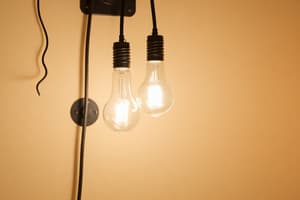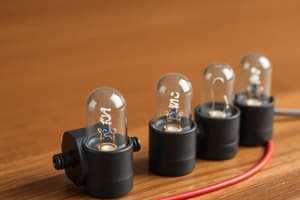Podcast
Questions and Answers
What is the primary reason electrical shocks occur?
What is the primary reason electrical shocks occur?
- A conductive material contacting the body (correct)
- Using appliances outdoors
- Contact with non-conductive materials
- Exposure to extreme heat
Which of the following is a preventative measure against electrical shocks?
Which of the following is a preventative measure against electrical shocks?
- Ignoring signs of warm outlets
- Using appliances near water sources
- Identifying and fixing faulty wiring (correct)
- Covering damaged cords with tape
What does a warm outlet typically signify?
What does a warm outlet typically signify?
- Possible issues with wiring behind the wall (correct)
- Normal functionality of the outlet
- Safe operation of appliances
- Imminent electrical failure
What is a common cause of light bulb burnout?
What is a common cause of light bulb burnout?
What should be done if an electrical outlet feels warm to the touch?
What should be done if an electrical outlet feels warm to the touch?
How can light bulb longevity be improved?
How can light bulb longevity be improved?
Which of the following statements is incorrect regarding warm outlets?
Which of the following statements is incorrect regarding warm outlets?
What is the best immediate action to take when dealing with a faulty outlet?
What is the best immediate action to take when dealing with a faulty outlet?
Flashcards are hidden until you start studying
Study Notes
Electrical Shocks
- Electrical shocks occur when a conductive material comes into contact with your body.
- Common causes include appliances coming into contact with water, faulty wiring, and defective appliances.
- To prevent shocks, keep electronic appliances away from water as water is a good conductor of electricity.
- Identify and replace devices with faulty wiring or damaged cords and plugs.
- Seek professional help from electricians when checking for defective household wiring.
Warm Outlets
- A warm outlet might indicate an issue behind the wall and should be addressed.
- Damaged outlet casing or wiring can cause the outlet to feel hot.
- Avoid touching a warm outlet as it may be carrying an electrical current causing a shock hazard.
- Contact an electrician to replace the outlet or wiring as soon as possible.
- Turn off the power to the circuit at the breaker until the outlet is replaced to prevent fire hazards.
Light Bulb Burnout
- Light bulb burnout is caused by factors like voltage fluctuations, poor connection, high temperatures, and frequent switching.
- To prevent burnout, install a voltage regulator or a surge protector to manage voltage fluctuations.
- Regularly inspect light fixtures and ensure tight connections.
- Use fixtures that allow for proper ventilation to prevent overheating.
- Limit the frequency of switching on and off the lights to extend the bulb's lifespan.
Studying That Suits You
Use AI to generate personalized quizzes and flashcards to suit your learning preferences.




